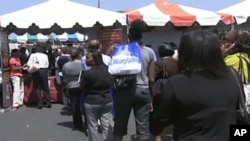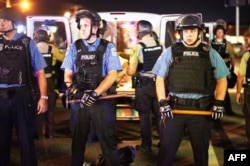A major U.S. civil rights organization says social and economic disparities persist in America, even though the economy has stabilized since the Great Depression nearly a decade ago.
In its 2016 State of Black America Report, the National Urban League provided a retrospective of racial equality in the United States since it started publishing the reports in 1976.
The similarities in 2016 compared with those of 1976 "are disheartening," Urban League President Mark Morial said as he unveiled the report Tuesday in Washington.
African-Americans are still twice as likely as whites to be unemployed, regardless of education level, and the household income remains about 40 percent lower, the report said.
And blacks in 2016 are only slightly less likely to live in poverty than they were 40 years ago.
The criminal justice picture is not much brighter, according to the report. In hundreds of U.S. police departments, the percentage of white police officers is more than 30 points higher than the percentage of whites in the communities they serve.
"Behind these statistics are real people — men, women, families, children — and they are affected in dramatic ways," Morial said.
The report challenged the nation's political leaders to address the disparities by adopting the group's version of the Marshall Plan, an American initiative that helped rebuild Western Europe after World War II.
Beginning in 1948, the U.S. provided today's equivalent of about $130 billion to Western European nations over four years.
With its Main Street Marshall Plan: Moving from Poverty to Prosperity, the Urban League proposed "sweeping and decisive" solutions requiring an investment of $1 trillion over five years to address the nation's social and economic disparities.
"Some say we cannot afford it. I say we cannot afford not to do it," Morial said. "There are too many neighborhoods locked out and left out."
The plan recommended investments in a variety of education programs, an inflation-adjusted $15 per hour minimum federal living wage, urban infrastructure, small businesses, home and tax credit programs and affordable technology.
The Urban League noted that in the past six years, the private sector has added more than 14 million new jobs.
"President Obama has gotten us to second base. Now we need to bring it home so that this recovery is complete,” Morial said.
The report, Morial hopes, "will pierce the dark veil of neglect" so the next U.S. president will see "the disparities are real, the conditions are tough. The times demand real leadership."













